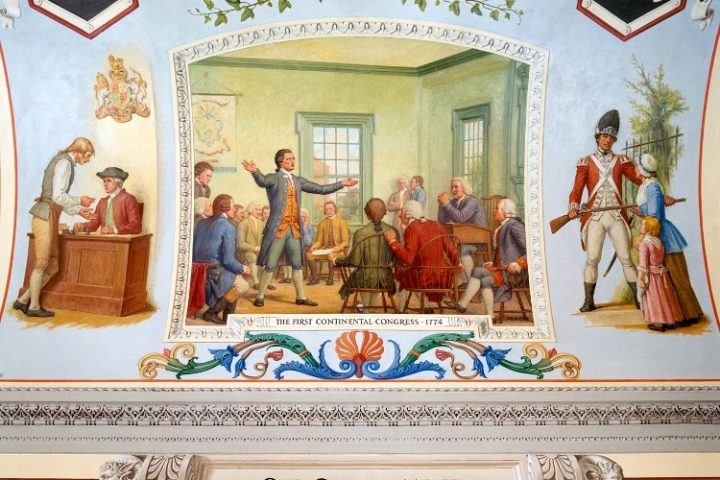
In the annals of American history, few gatherings resonate with the same profound significance as the first meeting of the Continental Congress on September 5, 1774, in the vibrant city of Philadelphia. This historic assembly, convened at Carpenter’s Hall, would set the stage for a revolutionary journey, ultimately culminating in the birth of 13 new states, new nations possessed of the all the powers of the state of Great Britain, the country whose policies propelled colonists to call for a congress. It was a pivotal moment, where representatives from the American colonies converged to address the grievances against British oppression, laying the cornerstone for what would become the United States of America.
Before rehearsing the cause and the call of the First Continental Congress, there is a timely lesson to be learned from the word “congress” itself.
The Founding Fathers were men who were very particular about the correct use of words. One would likely have predicted that, were the disparate colonies to call for a deliberative and perhaps lawmaking assembly, they would have named it a Parliament. As British subjects, many of whom were actually born in Britain, they were familiar with Parliament and with its role in British government. The reason the Founding Fathers did not call that assembly “Parliament” is simply because it wasn’t meant to be a parliament.
We can begin to understanding this by looking up the definition of “congress” in Dr. Samuel Johnson’s Dictionary of 1786: “an appointed meeting for settlement of affairs between different nations.”
This definition is confirmed by a statement made by Edmund Burke to the Electors of Bristol who were complaining to him that their particular interests were not being attended to by Parliament. Burke responded to their complaint, explaining:
Parliament is not a congress of ambassadors from different and hostile interests; which interests each must maintain, as an agent and advocate, against other agents and advocates; but parliament is a deliberative assembly of one nation, with one interest, that of the whole; where, not local purposes, not local prejudices, ought to guide, but the general good, resulting from the general reason of the whole.
By paying particular attention to the definitions, it is obvious why we are not celebrating the calling of the First Continental Parliament!
Parliament is a deliberative body for a whole nation, whereas congress is a gathering of ambassadors from sovereign states, coming together to represent the interests of their individual and independent constituencies.
Burke addressed the Electors of Bristol in 1774, the same year that the First Continental Congress was called into being in the American colonies. With that in mind, as well as the accepted definition of the word “congress,” we learn quite a valuable lesson about how our Founding Fathers saw themselves and the places from which they were sent to Congress in Philadelphia. It is instructive that knowing the definition of one key word can illuminate so much of how the Founders and framers of our government intended the states and the union of states to relate to each other and to function.
Now that that bit of unfamiliar and invaluable etymological history is out of the way, on to Philadelphia!
The Seeds of Dissent: Rising Tensions With Britain
By the early 1770s, tensions between the American colonies and the British Crown had reached a fever pitch. The military occupation of Boston and the imposition of taxes exemplified by the infamous Stamp Act of 1765 and the Tea Act of 1773 ignited widespread discontent. The colonists, who had long enjoyed a degree of autonomy, were growing increasingly resentful of repeated violations of the rights of Englishmen on the part of Parliament and the king. It was amid this maelstrom of discontent and defiance that the idea of convening a Continental Congress began to gain traction.
The Call for Unity: Committees of Correspondence
Throughout the colonies, Committees of Correspondence had emerged as critical networks for communication and coordination. These committees, formed in response to the Stamp Act crisis, allowed the geographically far-flung colonies to share information and opinions regarding British policies. Prominent figures such as Samuel Adams and John Adams played pivotal roles in these committees, laying the groundwork for a more organized response to British oppression.
Many of the varsity squad of Founding Fathers expressed their appreciation for the pivotal role played by thees committees in concerting the colonial response to British policies affecting them all.
“The unity of colonies in the same views and measures for the recovery of their rights is so important that I cannot but wish to see an intimacy and correspondence maintained between them,” Samuel Adams said.
John Dickinson echoed Adams’ call for unity: “We hope that by a spirited conduct and a proper correspondence, a more certain, equal, and easier mode of procuring a redress of grievances may be established than by an immediate application to Parliament.”
The Committees of Correspondence enabled a burgeoning sense of unity among the colonies. The idea of holding a congress where representatives from all colonies could meet to discuss their grievances and formulate a unified response began to take shape. This vision would soon crystallize into reality.
The Convening of the Continental Congress: A Gathering of Visionaries
On September 5, 1774, delegates from 12 of the 13 American colonies convened at Carpenter’s Hall in Philadelphia, Pennsylvania. Georgia did not send representatives due to ongoing conflicts with Native American tribes on its western frontier.
This extraordinary assembly brought together some of the most distinguished figures of the era. Among the luminaries present were George Washington, who would later become the first president of the United States; John Adams, a prolific patriot and future second president; and Peyton Randolph, who presided over the Congress. Together, these delegates represented the full spectrum of colonial interests and ideologies, from the conservative to the radical.
The Continental Congress: Crafting a Response
The primary objective of the Continental Congress was to address the grievances against British oppression and formulate a collective response. The delegates recognized the need for a united front, as divisions between the colonies could undermine their efforts.
One of the first actions of the Congress was to draft and send a petition to King George III, known as the “Olive Branch Petition.” This petition expressed the colonists’ loyalty to the king while appealing for redress of their grievances. Simultaneously, the Congress drafted a Declaration of Rights and Grievances, asserting their rights as Englishmen and condemning British policies that violated these rights.
Creating the Continental Association
The Congress also took significant steps toward economic resistance against British taxation and trade restrictions. It endorsed the creation of the Continental Association, a coordinated effort to enforce a boycott of British goods until their grievances were addressed. The Association established local committees to oversee compliance, marking a significant stride toward colonial unity.
The Legacy of the Continental Congress
The first Continental Congress lasted until October 26, 1774, and laid the groundwork for future cooperation among the colonies. It achieved several critical objectives: unity, petition and protest, and concerted economic resistance to British policies.
The first Continental Congress can be seen as a crucial step in the evolution of the American Revolution. It set the stage for the second Continental Congress, which would ultimately declare independence from Britain in 1776. The bonds formed and decisions made during that fateful September in Philadelphia reverberated through history, helping to shape the destiny of colonies that would soon declare themselves to be a union of “free and independent states.”
Conclusion: The Dawn of a New Era
The first meeting of the Continental Congress on September 5, 1774, was a watershed moment in American history. It was a moment when representatives from the American colonies came together to forge a path toward addressing and expressing their common grievances and securing their individual rights. This gathering of visionaries at Carpenter’s Hall laid the cornerstone for a united front against British oppression, setting in motion the events that would ultimately lead to the birth of the United States of America. The legacy of the Continental Congress endures, reminding us of the power of collective action in the face of adversity.



